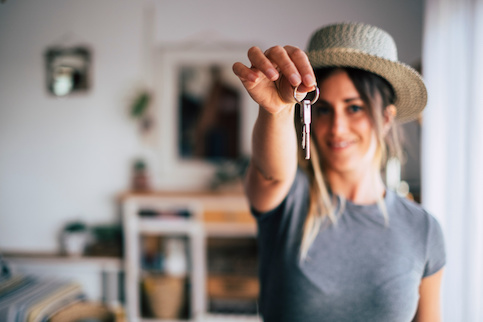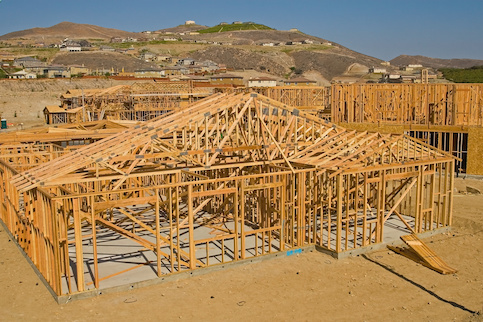Effective Nov. 16, 2025, both Fannie Mae and Freddie Mac no longer require a specific minimum credit score for conventional loan approval. Instead, loan decisions will be based on an analysis of overall credit risk factors.
Are you a borrower with a low credit score or an aspiring first-time home buyer who can’t afford to make a large down payment? If so, a Federal Housing Administration (FHA) loan may help you on the path to homeownership. FHA loans are a popular type of home loan that requires a 580 FICO® Score and a 3.5% down payment.
One “downside” to FHA loans is that – under most circumstances – you can only have one FHA mortgage at a time. While there are a few specific exceptions to the rule, you should explore alternative financing options if you’re trying to break into real estate investing.
Let’s look at why the general wisdom is that you can have only one FHA loan at a time, then explore the exceptions to this rule and explain how to qualify for a second FHA home loan.
Can You Have Two FHA Loans At The Same Time?
FHA loans help borrowers purchase primary residences. While there’s no limit to how many FHA mortgages you can get during your lifetime, you can generally only have one FHA loan at a time because you can only have one primary residence.
This restriction helps keep the loan program – and its lenient requirements – from being used to purchase investment properties.
See What You Qualify For
Buy A Home
Discover mortgage options that fit your unique financial needs.

Refinance
Refinance your mortgage to have more money for what matters.
Tap Into Equity
Use your home’s equity and unlock cash to achieve your goals.
When Can You Get A Second FHA Loan?
Even if you haven’t sold your current home or paid off your existing FHA loan, you may qualify for one of the following exceptions to the FHA’s restrictions on taking out multiple FHA loans.
Be aware that even if one of the exceptions applies to your situation, you’ll still need to prove to your lender that you can handle two mortgage payments on your monthly income.
Let’s review the potential FHA exceptions.
You’ve Relocated
Let’s say you’re relocating for a job, and it’s beyond a reasonable commuting distance from your current primary residence. Even if you’re financing your current home with an FHA loan, you may qualify for a second FHA loan for your new home even before you sell your old house.
Your Family Has Grown
If your family has outgrown your two-bedroom starter home, you may be able to take out a second FHA loan. To qualify, you’ll need to either:
- Have at least 25% equity in your current home; or
- Pay down your FHA loan’s balance to 75%
You must also document the increase in dependents through official channels.
You’re Co-Signing Another FHA Loan
If you’re already financing a primary residence with an FHA loan, you may be able to co-sign an FHA loan for a family member. Just keep in mind that the second FHA mortgage becomes your responsibility if your relative fails to make their monthly payments.
You’ve Gone Through A Divorce
If you’re moving from a house you shared with a co-borrower, you may qualify for a second FHA loan to buy a new primary residence. This situation is common when buying a house after divorce and your ex-spouse stays in your current home. However, you must document this situation with a filed divorce decree or separation agreement.
You’re Investing In An FHA Foreclosure
You may qualify for a second FHA mortgage if you use the loan to invest in a property the FHA has foreclosed on – otherwise known as a Department of Housing and Urban Development (HUD) real estate owned (REO) property.
Find A Mortgage Today and Lock In Your Rate!
Get matched with a lender that will work for your financial situation.
How Do You Qualify For Multiple FHA Loans?
You’ll still need to meet basic FHA loan requirements to qualify for multiple FHA loans. Lenders may have additional requirements for borrowers that are outside the FHA’s requirements.
Meet FHA Loan Qualifications
- Credit score: You’ll need at least a 580 credit score to qualify for an FHA loan. While you can qualify for an FHA loan with a credit score as low as 500, you’ll need to meet specific down payment requirements.
- Down payment: In most cases, FHA loans require a down payment of 3.5%. You may qualify for an FHA loan with a credit score between 500 and 579. However, you’ll need to put down 10% of the purchase price as a down payment.
- Debt-to-income ratio (DTI): While requirements may vary by lender, you’ll generally need a debt-to-income ratio of 43% or lower to qualify for an FHA loan.
- Additional requirements: Your lender may require that you have enough money in your savings account to cover your closing costs, the down payment and three monthly mortgage payments.
What Are Some Alternatives To Taking Out Multiple FHA Loans?
If you don’t meet the mortgage qualifications to take out a second FHA loan, you may need to take one of the following actions:
- Sell your current home. If you don’t qualify for multiple FHA loans, you may need to sell your current home before buying a new one. If you plan to keep your current home as a second home or investment property, you must pay off your current FHA mortgage before you apply for a new FHA loan.
- Rent until your home sells. Purchasing a home is often cheaper in the long run. But the upfront costs and mortgage requirements associated with a home purchase may mean you’ll need to rent instead of buy, especially if you don’t qualify for two FHA loans at the same time.
- Refinance your current FHA loan. To refinance your FHA loan to a conventional loan, you’ll need a minimum 620 credit score and a maximum DTI ratio of 50%. Replacing your FHA loan means you won’t pay a mortgage insurance premium (MIP). If you have 20% equity in your current home, you won’t pay private mortgage insurance (PMI) on your new conventional loan either.
- Finance with a low-down-payment conventional mortgage. If your income qualifies, you can purchase a home with a minimum credit score of 620 and a 3% down payment with the Fannie Mae HomeReady program. You can also finance your home purchase with a Freddie Mac Home Possible mortgage, which shares the same credit score and down payment requirements.
- Buy with another government-backed loan. If you and the property qualify, you can finance your new home with a Department of Veterans Affairs (VA) loan or a S. Department of Agriculture (USDA) loan.
The Bottom Line: You Can Get An FHA Loan Twice, But That’s The Exception
Over the course of homeownership, you can certainly take out more than one FHA loan. But you can’t have more than one FHA loan at a time unless you meet the FHA’s qualifying circumstances. Luckily, there are plenty of financing and refinancing options for borrowers who don’t qualify for more than one FHA loan at once.
Are you in the market for a new primary residence? Do you want to venture into real estate investing? Consider refinancing your existing FHA loan into a conventional loan with a cash-out refinance to fund your investment.
The U.S. Department of Housing and Urban Development (HUD) recently announced new loan limits for Federal Housing Administration (FHA) loans. Below are the 2026 FHA loan limits for low-cost and high-cost areas.
Low-cost areas
1-unit: $541,287
2-unit: $693,050
3-unit: $837,700
4-unit: $1,041,125
High-cost areas
1-unit: $1,249,125
2-unit: $1,599,375
3-unit: $1,933,200
4-unit: $2,402,625
Find out if an FHA loan is right for you.
See rates, requirements and benefits.

Victoria Araj
Victoria Araj is a Staff Writer for Rocket Companies who has held roles in mortgage banking, public relations and more in her 15-plus years of experience. She has a bachelor’s degree in journalism with an emphasis in political science from Michigan State University, and a master’s degree in public administration from the University of Michigan.












